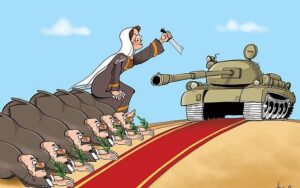Why is Columbia Journalism Review, the flagship publication of Columbia University’s prestigious Graduate School of Journalism, advancing the collapse of ethical journalism in favor of what Arab journalists working under repressive regimes call “journalism in the service of the revolution?”
The guiding light of ethical journalism for more than a century, the Society of Professional Journalist’s Code of Ethics recognizes “public enlightenment [as] the forerunner of justice and the foundation of democracy” and “strives to ensure the free exchange of information that is accurate, fair and thorough.”
On the opposite end of the informational spectrum lies Sahafat Ath-Thawra, or journalism in the service of the revolution. This model mandates the withholding of information, and the sculpting of news to fit the regime’s agenda. When Israeli journalist Yoni Ben Menachem asked a senior Palestinian official why the Palestinians don’t adopt democracy and a free press given their public’s great admiration for these values, the Fatah official responded:
Our situation is different, our mentality is different. We are in the middle of a revolution to establish a state and criticism of the regime and the leadership harms our struggle, and so we adopted the term “journalism in the service of the revolution.” Every journalist in the Palestinian Authority territory knows his limits and exercises self-censorship in order not to exceed the red lines. Whoever crosses them is punished.
“Instead of fighting back against the demise of journalism, CJR takes part in it,” this researcher charged in June, when the prestigious journalism publication not only failed to denounce hundreds of renegade journalists who declared war on SPJ’s essential Code of Ethics, but also embraced the signatories’ partisan, counterfactual terminology and formulations. In “From journalists, to journalists: Why reporting on Palestine has to change,” signatories of the open letter claim a journalist imperative to report according to “contextualized truth,” that is filtering all coverage through the fallacious lens of “Israel’s military occupation and its system of apartheid.”
The open letter signatories reside in free counties while journalists in the service of the revolution live under repressive regimes, but their work ethic is identical: reporting according to a predetermined narrative which necessarily negates the free exchange of information.
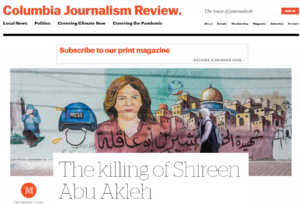 Jon Allsop’s May 13 CJR article, “The killing of Shireen Abu Akleh,” represents another devastating CJR-inflicted blow against ethical journalism. A cursory peek under the hood of Al Jazeera, the media outlet where veteran journalist Abu Akleh had worked for decades, and a key source in Allsop’s piece, underscores the severity of Allsop’s turn against professional journalism. Allsop, it should be noted writes the CJR‘s daily newsletter.
Jon Allsop’s May 13 CJR article, “The killing of Shireen Abu Akleh,” represents another devastating CJR-inflicted blow against ethical journalism. A cursory peek under the hood of Al Jazeera, the media outlet where veteran journalist Abu Akleh had worked for decades, and a key source in Allsop’s piece, underscores the severity of Allsop’s turn against professional journalism. Allsop, it should be noted writes the CJR‘s daily newsletter.
Qatar’s Al Jazeera, akin to President Vladimir Putin’s propaganda outfit Russia Today, is the antithesis of ethical journalism.
According to Freedom House’ Freedom in the World 2020, in Qatar:
Both print and broadcast media are influenced by leading families and subject to state censorship. The international television network Al-Jazeera is privately held, but the government has reportedly paid to support its operating costs since its inception in 1996. All journalists in Qatar practice a degree of self-censorship and face possible jail sentences for defamation and other press offenses. Access to the independent English-language website Doha News was blocked in late 2016 on the grounds that it did not have the required operating permit, and the blocking remained in place as of 2019. In April, the authorities closed the government-funded Doha Centre for Media Freedom without warning and arbitrarily terminated the contracts of its staff, giving no reason for the decision.
In short, in Qatar, there is neither democracy nor a free press. How, then, can Al Jazeera possibly “seek truth and report it,” a core value established by the Society for Professional Journalists?
According to the indispensable Code of Ethics, “The highest and primary obligation of ethical journalism is to serve the public,” or as a heading sums up: “Act Independently.” Given the conditions detailed in Freedom House’s report, what hope is there that the government-funded Al Jazeera acts independently to produce information that is “accurate and fair,” two foundation stones of ethical journalism?
Indeed, Al Jazeera’s record reflect reporting that is neither fair, nor accurate, and certainly not independent.
For some strange reason, Al Jazeera has cult status in some Western circles.
It shouldn’t. It should be viewed with contempt.
Here’s an updated “greatest hits” list to underscore that point:
— Gilead Ini (@GileadIni) June 9, 2021
The network’s record embodies a mission that is antithetical to ethical journalism. For example, Al Jazeera threw a birthday party for arch-terrorist Samir Kuntar, produced a video embracing Holocaust denial, and permitted host Yusuf Al-Qardawi to say on the air, “Oh Allah, take this oppressive, Jewish, Zionist band of people. Oh Allah, do not spare a single one of them. Oh Allah, count their numbers, and kill them, down to the very last one.”
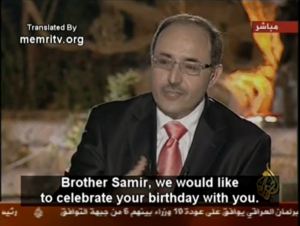
Screenshot of Al Jazeera’s birthday party for Samir Kuntar, terrorist convicted of smashing in the head of 4-year-old Einat Haran and shooting her father to death in front of her eyes. Her 2-year-old sister was smothered to death when her mother hid her from Kuntar. (Video from MEMRI)
In his account of the questions and competing complains surrounding the fatal shooting of Al Jazeera’s Shireen Abu Akleh, freelance journalist Allsop gives no indication about Al Jazeera’s identity as a propaganda outfit engaged in incitement, antisemitism and the glorification of terrorists.
Allsop is silent about the Qatari government’s control of Al Jazeera, and the total lack of free press under which the network works, as described by Freedom House. The closest he comes to disclosing this crucial background is his revelation that Al Jazeera is “based” in Qatar.
In his treatment of Al Jazeera as a credible media outlet, he accepts as fact the network’s unverified claims of Israeli responsibility for the shooting, citing “multiple witness accounts and Al Jazaeera’s definitive statements.” (In other words, they said it, so it’s true.)
As it turns out, Allsop is not alone in his esteem for Al Jazeera’s reporting. Last May, the network proudly received an award in recognition of its outstanding coverage granted by Hamas, designated as a terrorist organization by multiple Western countries.
Not only does Allsop cozy up to Al Jazeera and accept as gospel the outlet’s unproven claims, but he also outrageously goes on the offensive against Western media outlets. About the cautious reporting of colleagues who abide by professional codes of conduct which preclude reporting unconfirmed claims as fact, he complains:
Despite the multiple witness accounts and Al Jazeera’s definitive statements, no little Western media coverage of Abu Akleh’s killing centered ambiguity, and was sharply scrutinized on such terms by numerous journalists and observers. An initial Times headline stating simply that Abu Akleh had “died at 51” came in for particular criticism (the headline was subsequently changed), as did various outlets’ use of euphemistic language, including the word “clashes,” a common feature of Western journalism on violence in Israel and Palestine. … Yesterday, another unfortunately worded Times headline referred to “dueling” investigations in the case.
What does Columbia Journalism Review‘s criticism of journalists who responsibly treat unproven claims as just that – unproven – mean for today’s state of journalism?
Allsop’s propensity for uncritical recitation of claims by those who have proven themselves anything but credible is robust. “They [Israeli police] refuse to let Shireen be free,” he closes the article quotes lawyer Diana Buttu, “even in death.” Buttu, it’s worth calling, repeatedly and outlandishly lied on the air that Palestinian rockets contain no explosives, has fabricated that Israel’s security fence at the Gaza border is “electrified,” and rewrote history, falsely claiming that no Israelis were killed in suicide bombings from 1997 to 2000.
Buttu with Rick Sanchez on CNN , Dec. 29; with Greg Jarrett on Fox News, Dec. 30; with Octavia Nasr on CNN International on Jan. 1
Allsop also treats Quds News Network as a credible news agency, despite the fact that an editor has openly admitted that his outlet shuns ethical journalism, practicing instead journalism in the service of the revolution. Allsop reported:
Shatha Hanaysha, of the Palestinian Quds News Network, was also present and concurred, suggesting that whoever shot Abu Akleh evidently targeted an exposed part of her head since she was wearing a helmet at the time.
The Associated Press reported about Quds News Network: "The site says it is independent, but has a reputation for being affiliated with Islamic Jihad, a Palestinian militant group." AP continued:
“Our message is twofold. Number one is to support the resistance. Second, expose the aggressive acts of the Israeli occupation,” said Ahmed Yousef, 25, an editor at Quds News Network.
Quds takes its mission to "support the resistance" seriously, routinely glorifying murderers of Israeli civilians.
Like the Quds resistance supporters, freelancer Allsop also has difficulty distinguishing between journalism and terror activity. Thus, he writes in the esteemed CJR:
In 2018, Israeli snipers shot and killed Ahmed Abu Hussein and Yasser Murtaja, both of whom were covering protests at the border between Israel and Gaza and wearing press vests.
Abu Hussein, a journalist who worked with Bisann News and Voice of Palestine Radio, was a member of the Popular Front for the Liberation of Palestine (PFLP), a U.S.-designated terror group, according to an April 30, 2018 report by the Meir Amit Intelligence and Terrorism Information Center (ITIC).
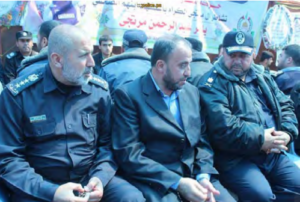
Senior Hamas police officials in the Gaza Strip, headed by Police Commissioner Taysir al-Batsh (right), making a condolence call for "journalist" Yasser Murtaja (Gaza Police website, April 8, 2018, via ITIC)
As for his colleague Murtaja, Walla news reported (translated from Hebrew by ITIC):
According to Israeli security sources, press photographer Yasser Murtaja was a Hamas operative. According to the same sources, he served for years as an officer with the rank of captain in the Hamas security services in the Gaza Strip. The same sources added, based on information that they possess, that he was an operative who was active in the security services on a daily basis and greatly assisted them in their activity. The same security sources added that in March 2015, Murtaja attempted to bring a drone from Israel to the Gaza Strip to collect preliminary intelligence before operations by the Hamas security services. Of late, Yasser Murtaja continued to work with senior Hamas internal security officials in the Gaza Strip, many of whom made condolence calls at his family’s home.
Allsop's mistaking of anti-Israel activity for journalism catches the Palestinian Journalists Syndicate (PJS) in its wide net. PJS's acronym closely resembles that of the Society for Professional Journalists (SPJ), but their missions and activities are worlds apart. PJS, the Palestinian syndicate, advances a boycott of Israeli journalists, thereby endangering their lives. SPJ, representing ethical journalism, calls for the exchange of free information, without regard to ethnic, national or religious identity.
Allsop reports:
Two weeks ago, the Palestinian Journalists Syndicate, along with the International Federation of Journalists and the International Federation of Journalists and the International Centre of Justice for Palestinians, filed a war-crimes case at the ICC alleging that Israel has systematically targeted journalists in Palestine and failed to properly investigate its own abuses.
Relying on PJS when it comes to safety of journalists is akin to putting the fox in charge of the hen house. Calling for the targeting of Israeli journalists and Palestinian sources who dare speak with them, Nasser Abu Baker, then deputy chairman of the syndicate, threatened:
I call upon all male and female colleagues/journalists to boycott any Palestinian official, regardless of how senior he/she is, who conducts an interview with Israeli journalists and Israeli media…this poisonous media whose only goal is to broadcast dissent and incite against our people. Their media, which is directed by their government, is one of the tools of the occupation. Therefore, the time has come for a comprehensive boycott of their media. The Syndicate will have a clear position on this and I plead with all the journalists to abide. We will publish the name of any official who gives an interview to their media from this moment.
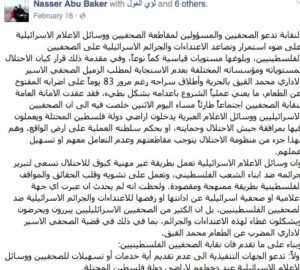 A similar statement announcing the boycott, posted on Abu Baker’s Facebook page and signed by the PJS "general secretariat," appears at left.
A similar statement announcing the boycott, posted on Abu Baker’s Facebook page and signed by the PJS "general secretariat," appears at left.
Incidentally, Abu Baker sits on the executive committee of the International Federation of Journalists, which Allsop also cites. IFJ's credibility as an organization genuinely concerned about the safeguarding of journalists regardless of their national or ethnic identity is eroded by its protective defense of Abu Baker. Moreover, IFJ's own anti-Israel behavior reportedly culminated in the 2009 ejection of the National Federation of Israeli Journalists from the organization on the alleged grounds of failure to pay fees. But Haim Shibi, director of the Journalists Association in Jerusalem, and formerly a senior official in the National Federation of Israeli Journalists, has a very different account as to what transpired, citing “a blatant and ongoing anti-Israel bias, which escalated over the years.”
Allsop rightly noted that Shireen Abu Akleh's killing brought tributes from around the Arab world. He accurately reported:
Mahmoud Abbas, the leader of the Palestinian Authority, described Abu Akleh as a “martyr for truth,”and awarded her the Star of Jerusalem, or Quds Star, an honor traditionally reserved for political dignitaries. One of her colleagues told the Post that the public outpouring of grief was comparable to that which followed the death of Yasser Arafat, the former Authority leader.
The Palestinian Authority's embrace of Shireen Abu Akleh, honoring her with a distinction reserved for political dignitaries, is revealing. MSNBC's headline — "Shireen Abu Akleh Was a Voice for Palestine" — was similarly telling, and accurate.
As a star journalist for a Qatari-controlled network which embodies journalism in the service of the revolution, she truly was a voice for Palestine deserving of state honors. But that's a partisan role which simply cannot coexist with ethical journalism committed "to free exchange of information that is accurate, fair and thorough."
With Allsop's "The killing of Shireen Abu Akleh," Columbia Journalism Review's embraces practices diametrically opposed to ethical journalism, once again lending a hand to the demise of ethical journalism.
As "the voice of journalism," CJR's conduct carries great weight, setting the standards of behavior across the industry. The killing of ethical journalism and the free exchange of information poses a threat to both justice and democracy. Is that really the legacy that the once venerable publication seeks?

